Confidence is a quality that can make a world of difference in our personal and professional lives. It empowers us to take risks, face challenges, and pursue our goals with unwavering determination. While confidence may come naturally to some, it’s a skill that can be cultivated and strengthened over time. One powerful way to boost your self-assurance is through the wisdom and insights found in books.
Here the list of the top 10 books on confidence that are not only inspiring but also offers practical advice and strategies for developing a stronger sense of self. Whether you’re looking to overcome self-doubt, improve your self-esteem, or simply gain a deeper understanding of what it means to be confident, these books have got you covered.
Table of Contents
1. Mindset: The New Psychology of Success
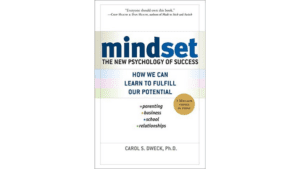
“Mindset: The New Psychology of Success” by Carol S. Dweck is an insightful book that explores the concept of mindset and its impact on our lives. Dweck introduces two main mindsets: the fixed mindset and the growth mindset. In a fixed mindset, people believe that their abilities and intelligence are fixed traits, and they avoid challenges, fearing failure.
On the other hand, in a growth mindset, individuals believe that their abilities can be developed through dedication and hard work. They embrace challenges, persevere through setbacks, and see failures as opportunities to learn and grow. Dweck’s book offers numerous real-life examples and research findings to illustrate the power of mindset in various aspects of life, from education and business to relationships.
She argues that by adopting a growth mindset, we can achieve more, develop resilience, and lead more fulfilling lives. “Mindset” is a valuable read for anyone looking to understand how their beliefs about abilities and potential can shape their success and happiness. It offers practical advice for cultivating a growth mindset and transforming the way we approach challenges and opportunities.
2. You Are a Badass
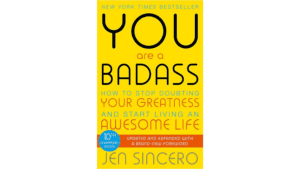
“You Are a Badass” by Jen Sincero is a self-help book that encourages readers to overcome self-doubt and live their best lives. Sincero’s central message is that we all possess the potential for greatness, and it’s essential to believe in ourselves and our abilities.
The book is divided into concise, actionable chapters that cover a range of topics, from identifying and conquering limiting beliefs to setting and achieving goals. Sincero emphasizes the importance of adopting a positive mindset, embracing self-love, and taking bold actions to pursue our dreams.
Throughout the book, Sincero shares personal anecdotes and humorous insights, making complex self-improvement concepts accessible and relatable. She advocates for stepping out of comfort zones, taking risks, and embracing change.
3. The Secret

“The Secret” by Rhonda Byrne is a self-help book that explores the concept of the Law of Attraction. Published in 2006, it has gained widespread popularity for its claims that positive thinking can bring about positive outcomes in one’s life.
The book begins by introducing the Law of Attraction, which posits that thoughts have a powerful magnetic force that attracts similar thoughts, circumstances, and events. In other words, if you focus on positive thoughts and visualize your desires, the universe will conspire to make them a reality.
Throughout the book, Byrne emphasizes the importance of gratitude and the role it plays in manifesting one’s desires. She argues that by expressing gratitude for what you have, you can attract more positive experiences into your life. “The Secret” also discusses the impact of beliefs on one’s reality.
Byrne suggests that limiting beliefs can block the flow of positive energy and prevent individuals from achieving their goals. To counter this, she encourages readers to change their beliefs and adopt a mindset of abundance and positivity.
4. Man’s Search for Meaning
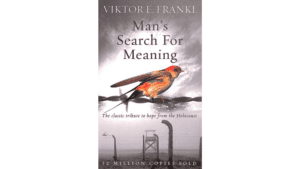
“Man’s Search for Meaning” is a remarkable book by Viktor E. Frankl tells his powerful story of surviving the Holocaust and shares his wisdom about finding meaning in life. In the first part of the book, Frankl describes the terrible conditions he faced in Nazi concentration camps.
It’s a heartbreaking but important account of human suffering and resilience. The second part introduces his idea of “logotherapy,” a therapy based on the belief that finding meaning is the key to a fulfilling life. Frankl argues that even in the worst situations, we have the power to choose our attitudes and find purpose. This message is incredibly inspiring.
5. Awaken the Giant Within
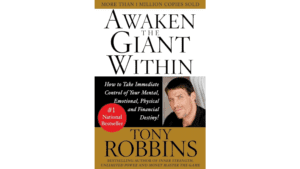
“Awaken the Giant Within” by Tony Robbins is a self-help book that aims to help you take control of your life and achieve your dreams. Robbins believes that you have the power to shape your destiny by mastering your thoughts, emotions, and actions. In the book, he discusses the concept of “neuro-linguistic programming” (NLP), which is a way to change your thinking patterns and behaviors to achieve success.
He emphasizes setting clear goals, creating a compelling vision for your life, and taking consistent action to reach your objectives. Robbins also explores the idea of “personal power” and how you can tap into it to overcome challenges and achieve your desires. He shares practical strategies for improving your health, relationships, finances, and overall well-being.
6. The Gifts of Imperfection
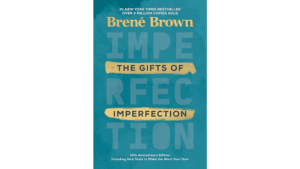
“The Gifts of Imperfection” by Brené Brown is a book that explores the idea that embracing our imperfections is the key to living a wholehearted and fulfilling life. Brown believes that our society often pressures us to be perfect, which leads to feelings of inadequacy and shame. She suggests that true happiness and self-acceptance come from letting go of these unrealistic expectations.
In the book, Brown introduces ten guideposts for wholehearted living, including cultivating self-compassion, letting go of perfectionism, and embracing vulnerability. She encourages readers to practice courage, compassion, and connection in their lives. Brown’s research and personal anecdotes illustrate the importance of authenticity and embracing our vulnerabilities. She believes that by embracing our imperfections, we can lead more authentic, joyful, and meaningful lives.
7. The Power of Now
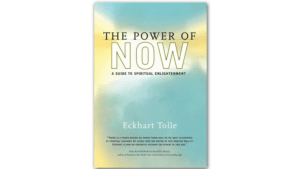
“The Power of Now” by Eckhart Tolle is a transformative book that explores the profound concept of living in the present moment. Tolle argues that most human suffering arises from our identification with our thoughts and our attachment to the past or future, which keeps us from experiencing true inner peace and happiness.
The book guides readers on a journey to understand the importance of mindfulness and being fully present in each moment. Tolle introduces the idea that our true essence is beyond our thoughts, and he teaches techniques to quiet the constant chatter of the mind. Tolle emphasizes that by embracing the present moment, we can free ourselves from the grip of our ego and find spiritual enlightenment. He encourages readers to let go of negative thought patterns, judgments, and the need for external validation.
8. The 7 Habits of Highly Effective People
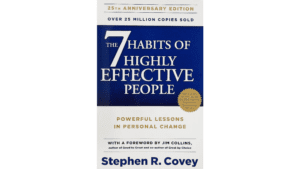
“The 7 Habits of Highly Effective People” by Stephen R. Covey is a widely acclaimed self-help and personal development book that provides a framework for achieving personal and professional success. Covey’s book outlines seven key habits that, when adopted and practiced, can lead to greater effectiveness in all aspects of life.
The seven habits are as follows:
- Be Proactive: Take control of your actions and responses to external events, rather than reacting impulsively.
- Begin with the End in Mind: Set clear goals and envision what you want to achieve in the long run.
- Put First Things First: Prioritize tasks and focus on the most important and impactful activities.
- Think Win-Win: Seek mutually beneficial solutions in interactions and relationships, rather than approaching them as zero-sum competitions.
- Seek First to Understand, Then to Be Understood: Practice empathetic listening and try to understand others’ perspectives before expressing your own.
- Synergize: Collaborate and work effectively with others to achieve better results than you could on your own.
- Sharpen the Saw: Take care of your physical, mental, emotional, and spiritual well-being to maintain balance and sustain long-term effectiveness.
9. The Four Agreements
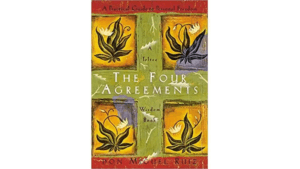
“The Four Agreements” by Don Miguel Ruiz is a spiritual and self-help book that offers a code of conduct for living a fulfilling and authentic life. The author draws on ancient Toltec wisdom to present four foundational agreements that can lead to personal freedom and happiness:
- Be Impeccable with Your Word: This agreement encourages honesty and integrity in communication. It emphasizes the importance of speaking truthfully and avoiding gossip or harmful language.
- Don’t Take Anything Personally: This agreement reminds us not to take the words and actions of others personally. It suggests that people’s behaviors are often a reflection of their own beliefs and experiences, not a judgment of us.
- Don’t Make Assumptions: Ruiz advises against making assumptions about the intentions or thoughts of others. Instead, he encourages clear and open communication to avoid misunderstandings.
- Always Do Your Best: This agreement encourages giving your best effort in everything you do, without self-judgment or self-criticism. It recognizes that your best may vary from day to day.
10. Radical Acceptance
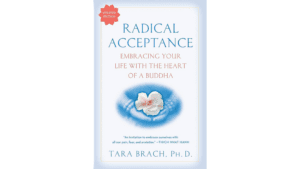
“Radical Acceptance” by Tara Brach is a book that explores the practice of embracing ourselves and our lives with deep compassion and acceptance. Brach, a psychologist and meditation teacher, offers insights and techniques to help individuals break free from self-judgment and self-criticism.
The book emphasizes the importance of acknowledging our feelings, thoughts, and experiences without resistance or denial. Brach believes that by accepting our imperfections and vulnerabilities, we can heal emotional wounds and live more authentic and fulfilling lives.
“Radical Acceptance” introduces mindfulness and meditation practices as tools to cultivate self-compassion and presence in the moment. It encourages readers to let go of the need for perfection and the illusion of control, which can lead to suffering and disconnection.
Also read:


